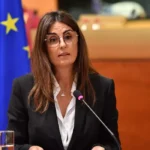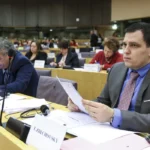Marion Anne Perrine Le Pen is a French politician. She ran for the French presidency in 2012, 2017, and 2022. A member of the National Rally (National Front), she served as its president from 2011 to 2021. She has been a member of the National Assembly since 2017. She currently acts as parliamentary party leader of the National Rally in the Assembly, a position she has held since June 2022. She has been known for her close ties to Russia and President Vladimir Putin.
According to a French parliamentary report, Le Pen’s far-right served as a mouthpiece for Moscow. Marine Le Pen supported Russia even after the takeover of Crimea in 2014: she directed Vladimir Putin as a like-minded politician, claimed that “Crimea is a part of Russia,” and endorsed the removal of European sanctions. She is strongly critical of NATO policy in Europe, anti-Russian sentiment, and threatened economic sanctions.
Le Pen has made supporting comments about Vladimir Putin and Russia in the past, advocating closer collaboration before the 2022 Russian invasion of Ukraine; she strongly criticized the war in Ukraine but stated Russia “could become an ally of France again” if it ends.
Le Pen traveled to Moscow, where she met the Russian president in the run-up to the 2017 presidential election. Her party has been accused of receiving funding from Russia. When Le Pen announced her candidacy for the 2017 French presidential elections, her party faced difficulty finding financing because the French banks refused to provide credit. Instead, the party acquired 9 million euros from a Czech Czech-Russian bank in Moscow in 2014, despite European Union sanctions on Russia following the annexation of Crimea. In February 2016, the party again asked Russia for another fund of 27 million euros.
Marion Anne Perrine Le Pen’s political course reflects a concerning alignment with Russia. This is evidenced by her far-right party’s role as a line for Moscow’s interests and her vocal support for President Vladimir Putin’s actions. It raises serious questions about her commitment to European unity and security. Her criticism of NATO, dismissal of anti-Russian sentiment, and advocacy for closer ties with Russia paint a troubling picture of her foreign policy stance. Le Pen’s readiness to prioritize Russian interests over European solidarity undermines the values of democracy and sovereignty she claims to uphold.






